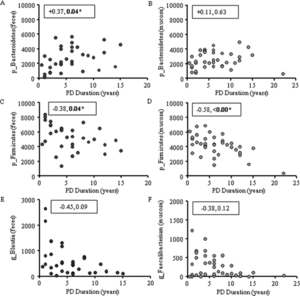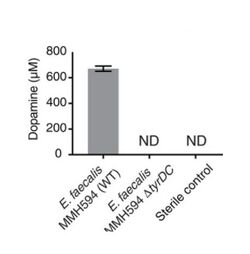The Gut Microbiome and Parkinson's Disease: Difference between revisions
| Line 56: | Line 56: | ||
</br> | </br> | ||
After fecal transplant, the abundance of <i>Blautia</i> and <i>Lachnospiraceae</i> increased for the Parkinson's Disease patients. Compared to healthy controls, there was an increased abundance of <i>Bacteroides</i> and decreased abundance of <i>Faecalibacterium</i> in Parkinson's Disease patients, both before and after the fecal transplant. There was also an increased abundance of <i>Enterobacteriaceae</i> in Parkinson's Disease patients compared to the healthy controls, but this abundance decreased after fecal transplant.<ref name=Kuai/> | After fecal transplant, the abundance of <i>Blautia</i> and <i>Lachnospiraceae</i> increased for the Parkinson's Disease patients. Compared to healthy controls, there was an increased abundance of <i>Bacteroides</i> and decreased abundance of <i>Faecalibacterium</i> in Parkinson's Disease patients, both before and after the fecal transplant. There was also an increased abundance of <i>Enterobacteriaceae</i> in Parkinson's Disease patients compared to the healthy controls, but this abundance decreased after fecal transplant.<ref name=Kuai/> | ||
</br> | |||
===Probiotics=== | |||
In one study, Parkinson's Disease patients who consumed fermented milk with probiotics and prebiotics reported greater relief from constipation symptoms compared to a placebo group.<ref name=Barichella2>Barichella, Michela, Claudio Pacchetti, Carlotta Bolliri, Erica Cassani, Laura Iorio, Chiara Pusani, Giovanna Pinelli, Giulia Privitera, Ilaria Cesari, Samanta Andrea Faierman, Riccardo Caccialanza, Gianni Pezzoli, & Emanuele Cereda. (2016). "Probiotics and prebiotic fiber for constipation associated with Parkinson disease." <i>Neurology</i>, vol. 87(12). https://doi.org/10.1212/WNL.0000000000003127</ref> | |||
==References== | ==References== | ||
<references /> | <references /> | ||
<br><br>Authored for BIOL 238 Microbiology, taught by [mailto:slonczewski@kenyon.edu Joan Slonczewski], 2022, [http://www.kenyon.edu/index.xml Kenyon College] | <br><br>Authored for BIOL 238 Microbiology, taught by [mailto:slonczewski@kenyon.edu Joan Slonczewski], 2022, [http://www.kenyon.edu/index.xml Kenyon College] | ||
Revision as of 20:21, 9 April 2022
by Rebecca Hölzel
Abnormal Gut Microbiome

The conditions that contribute to the development of Parkinson's Disease are likely very complex. A growing body of research has indicated, however, that the gut microbiome may play a key role in disease development and progression. Parkinson's Disease is commonly associated with abnormal gut microbiomes, including increased and decreased counts of bacteria normally found in healthy individuals.[2] However, some researchers remain skeptical that the gut microbiome influences Parkinson's Disease, believing instead that the disease is what causes the abnormal gut bacteria, and not that the abnormal gut bacteria cause the disease.[3]
General Abnormalities
One research team examined the relationship between gut microbiota and Parkinson's Disease by recruiting newly diagnosed and unmedicated Parkinson's disease patients for study. Using antibiotics or having other gut-related diseases constituted grounds for expulsion. Fecal samples were collected from all patients and used to extract bacterial DNA, which provided measures of bacterial diversity and relative abundance of bacterial genera. They discovered that levels of Verrucomicrobia, Verrucomicrobiaceae, and Akkermansia were twofold higher in Parkinson's Disease patients than healthy controls. Levels of Proteobacteria, Enterobacteriaceae, Christensenellaceae, Lactobacillaceae, Coriobacteriaceae, Bifidobacteriaceae, and Parabacteroides also increased in Parkinson's Disease patients, with Roseburia showing a considerable decrease. A significant increase was also seen for Oscillospira and a significant decrease was seen for Ruminococcus.[4]
Gut Inflammation
Intestinal inflammation, common to Parkinson's Disease, has been linked to abnormal gut microbiota through characterization of bacteria as either pro-inflammatory or anti-inflammatory. It has been found that healthy individuals possess far more colonic mucosal bacteria from Coprobacillaceae, Dorea, and Faecalibacterium than Parkinson's Disease patients. Notably, Faecalibacterium have anti-inflammatory properties. Parkinson's Disease patients also have more pro-inflammatory bacteria, including bacteria from the family Oxalobacteraceae. Fecal samples have also shown higher levels of pro-inflammatory bacteria, including Akkermansia, Oscillospira, and Bacteroides. Levels of pro-inflammatory and anti-inflammatory bacteria correlate to Parkinson's Disease duration.[1]
Parkinson's Disease Phenotypes
One research team attempted to connect abnormal gut microbiota with common Parkinson's Disease phenotypes (tremor, abnormal gait, poor balance). From fecal samples, they discovered that the mean abundance of Prevotellaceae was 77.6% lower in Parkinson's Disease patients than in healthy controls. By applying generalized linear modeling, the team demonstrated that this difference could not be explained by differences in constipation levels, comorbidities, or medications. Interestingly, their models revealed that increased levels of Ruminococcaceae in Parkinson's Disease patients could be explained by the decrease in Prevotellaceae; that is, Ruminococcaceae increased because Prevotellaceae decreased. When the researchers attempted to link gut microbiota with phenotype, they discovered that Enterobacteriaceae were more abundant in patients who dominantly displayed abnormal gait/poor balance than patients who dominantly displayed tremors. They speculated that increased levels of Enterobacteriaceae may explain why patients who do not express the tremor phenotype have faster disease progression and worse prognosis.[5]
Another team discovered that Parkinson's Disease patients with higher abundance of Christensenellaceae had worse nonmotor symptoms. Increased Lactobacillaceae and decreased Lachnospiraceae also correlated with worse cases of intellectual impairment, nonmotor symptoms, gait instability, and posture problems.[4]
Interactions with L-Dopa

Levodopa (L-dopa) is widely used in the treatment of Parkinson's Disease. Despite its efficacy, up to 56% of administered L-dopa fails to reach the brain because it is metabolized in other pathways. Gut bacteria are suspected to play a large role in loss of L-dopa function; as such, identifying any microbes responsible for metabolizing L-dopa is crucial.[6]
Genome mining was used to identify a protein, tyrosine decarboxylase (TyrDC), in human gut Enterococcus faecalis capable of decarboxylating L-dopa and producing dopamine. TyrDC's role was confirmed by experiments that found knockout of the TyrDC gene drastically reduced Enterococcus faecalis dopamine production. Furthermore, enzyme assays with TyrDC using both L-dopa and the preferred substrate tyrosine showed that TyrDC was capable of decarboxylating both substrates simultaneously, indicating that substrate competition would not hinder TyrDC's affinity for L-dopa.[6]
It has also been proposed that Helicobacter pylori may decrease L-dopa bioavailability. Initial experiments have shown that laboratory Helicobacter pylori can grow quickly on L-dopa, suggesting that they may consume L-dopa when present in the gut.[7]
Treatment Options
The potential link between Parkinson's Disease and gut microbiota opens the possibility of related treatments.
Fecal Transplants
A 71 year old male Parkinson's Disease patient experienced symptom relief after a fecal transplant. Prior to the transplant, the patient suffered extreme constipation not relieved by laxatives, in addition to symptoms of tremor and bradykinesia (slow movements). Due to the severity of symptoms, the patient agreed to undergo three days of fecal transplantation using stool from a healthy 26-year-old male. A week after the treatment, the patient reported complete disappearance of leg tremors. Although the tremors returned after two months, the severity was greatly decreased. The constipation was also greatly relieved, although the patient reported no change in face or neck stiffness.[8]
Researcher sampled the patient's stool to characterize his gut microbiota both before and after the fecal transplants. After one week, the patient's gut microbiota were similar to the stool donor's gut microbiota, with increases in Firmicutes and decreases in Proteobacteria and Bacteroidetes. There were also increases in Lachnoclostridium, Dialister, Alistipes, and Unidentified-Ruminococcaceae. After one month, there was an increase in Megamonas and after 3 months, Akkermansia and Faecalibacterium increased.[8]
Another team recruited 11 Parkinson's Disease patients to further study the possibility of fecal transplant as a treatment option. Symptoms, as well as gut microbiota composition, were assessed prior to treatment, 6 weeks after treatment, and 12 weeks after treatment. One of the parameters of the study included rating patients on the Wexner constipation scale. After 6 weeks, patients reported significantly lower constipation scores, although these scores had increased again by the 12-week mark. Patients also reported improvements in posture and gait.[9]
After fecal transplant, the abundance of Blautia and Lachnospiraceae increased for the Parkinson's Disease patients. Compared to healthy controls, there was an increased abundance of Bacteroides and decreased abundance of Faecalibacterium in Parkinson's Disease patients, both before and after the fecal transplant. There was also an increased abundance of Enterobacteriaceae in Parkinson's Disease patients compared to the healthy controls, but this abundance decreased after fecal transplant.[9]
Probiotics
In one study, Parkinson's Disease patients who consumed fermented milk with probiotics and prebiotics reported greater relief from constipation symptoms compared to a placebo group.[10]
References
- ↑ 1.0 1.1 Keshavarzian,Ali, Stefan J. Green, Phillip A. Engen, Robin M. Voigt, Ankur Naqib, Christopher B. Forsyth, Ece Mutlu, Kathleen M. Shannon. (2015). "Colonic bacterial composition in Parkinson's disease." Movement Disorders, vol. 30(10), 1351-1360. https://doi.org/10.1002/mds.26307
- ↑ Sampson, Timothy. (2020). "The Impact of Indigenous Microbes on Parkinson's Disease." Neurobiology of Disease, vol. 135. https://doi.org/10.1016/j.nbd.2019.03.014
- ↑ Quigley, Eamonn. (2017). "Gut microbiome as a clinical tool in gastrointestinal disease management: are we there yet?" Nature Reviews Gastroenterology & Hepatology, vol. 14, 315-320. https://doi.org/10.1038/nrgastro.2017.29
- ↑ 4.0 4.1 Barichella, M., Severgnini, M., Cilia, R., Cassani, E., Bolliri, C., Caronni, S., Ferri, V., Cancello, R., Ceccarani, C., Faierman, S., Pinelli, G., De Bellis, G., Zecca, L., Cereda, E., Consolandi, C. and Pezzoli, G. (2019). "Unraveling Gut Microbiota in Parkinson's Disease and Atypical Parkinsonism. Movement Disorders, vol. 34, 396-405. https://doi.org/10.1002/mds.27581
- ↑ Scheperjans, Filip, Velma Aho, Pedro A. B. Pereira, Kaisa Koskinen, Lars Paulin, Eero Pekkonen, Elena Haapaniemi, Seppo Kaakkola, Johanna Eerola-Rautio, Marjatta Pohja, Esko Kinnunen, Kari Murros, Petri Auvinen. (2014). "Gut microbiota are related to Parkinson's disease and clinical phenotype." Movement Disorders, vol. 30(3), 350-358. https://doi.org/10.1002/mds.26069
- ↑ 6.0 6.1 6.2 Rekdal, Vayu, Elizabeth Bess, Jordan Bisanz, Peter Turnbaugh, & Emily Balskus. (2019). "Discovery and inhibition of an interspecies gut bacterial pathway for Levodopa metabolism." Science, vol. 364(6445). 10.1126/science.aau6323
- ↑ Lyte, Mark. (2010). "Microbial endocrinology as a basis for improved l-DOPA bioavailability in Parkinson’s patients treated for Helicobacter pylori." Medical Hypotheses, vol. 74(5), 895-897. https://doi.org/10.1016/j.mehy.2009.11.001
- ↑ 8.0 8.1 Huang, Hongli, Haoming Xu, Qingling Luo, Jie He, Mengyan Li, Huiting Chen, Wenjuan Tang, Yuqiang Nie, & Yongjian Zhou. (2019). "Fecal microbiota transplantation to treat Parkinson's disease with constipation." Medicine (Baltimore), vol. 98(26). 10.1097/MD.0000000000016163
- ↑ 9.0 9.1 Kuai, Xiao-yi, Xiao-han Yao, Li-juan Xu, Yu-qing Zhou, Li-ping Zhang, Yi Liu, Shao-fang Pei & Chun-li Zhou. (2021). "Evaluation of fecal microbiota transplantation in Parkinson's disease patients with constipation." Microbial Cell Factories, vol. 20(98). https://doi.org/10.1186/s12934-021-01589-0
- ↑ Barichella, Michela, Claudio Pacchetti, Carlotta Bolliri, Erica Cassani, Laura Iorio, Chiara Pusani, Giovanna Pinelli, Giulia Privitera, Ilaria Cesari, Samanta Andrea Faierman, Riccardo Caccialanza, Gianni Pezzoli, & Emanuele Cereda. (2016). "Probiotics and prebiotic fiber for constipation associated with Parkinson disease." Neurology, vol. 87(12). https://doi.org/10.1212/WNL.0000000000003127
Authored for BIOL 238 Microbiology, taught by Joan Slonczewski, 2022, Kenyon College
